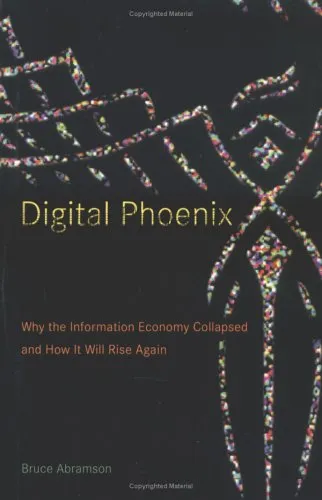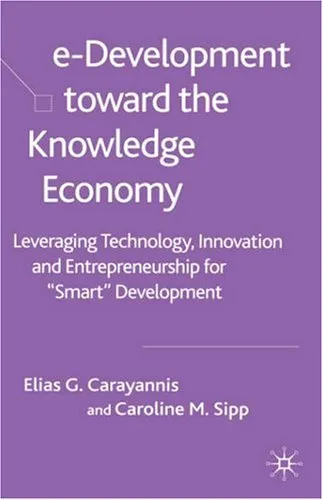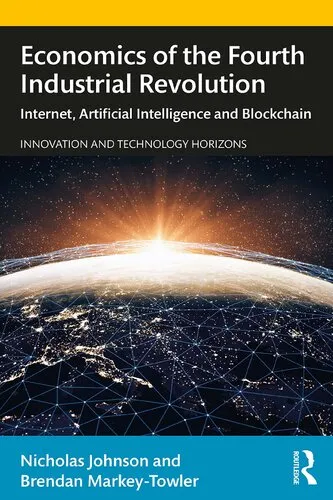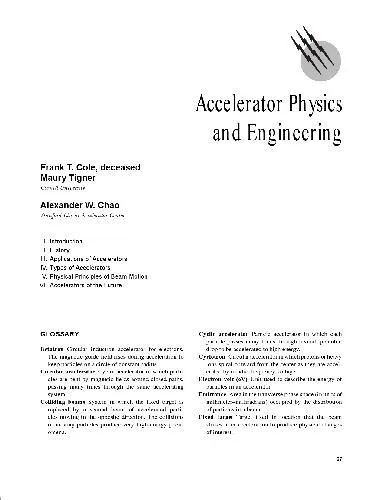Digital Phoenix: Why the Information Economy Collapsed and How It Will Rise Again
4.0
بر اساس نظر کاربران

شما میتونید سوالاتتون در باره کتاب رو از هوش مصنوعیش بعد از ورود بپرسید
هر دانلود یا پرسش از هوش مصنوعی 2 امتیاز لازم دارد، برای بدست آوردن امتیاز رایگان، به صفحه ی راهنمای امتیازات سر بزنید و یک سری کار ارزشمند انجام بدینکتاب های مرتبط:
معرفی کتاب دیجیتال فونیکس: چرا اقتصاد اطلاعاتی سقوط کرد و چگونه دوباره احیا خواهد شد
کتاب «Digital Phoenix: Why the Information Economy Collapsed and How It Will Rise Again» به قلم بروس آبراسون نگاهی جامع و عمیق به چرایی شکست اولیه اقتصاد اطلاعاتی و مسیرهایی که میتوان این اقتصاد را دوباره به نقطه شکوفایی بازگرداند، ارائه میدهد. این کتاب به تحلیل تغییرات، تحولات اقتصادی، و فناوریهای کلیدی مؤثر بر اقتصاد دیجیتال میپردازد.
خلاصه جامع کتاب
دهه 90 میلادی شاهد گسترش سریع و چشمگیر فناوریهای دیجیتال بود. ظهور اینترنت و تحولاتی چون تجارت الکترونیکی، گسترش شبکههای اطلاعاتی و نوآوری در فناوری اطلاعات، نویددهنده عصری بود که به اشتباه آن را "انقلاب اطلاعاتی" مینامیدند. اما این روند با سقوط دات-کامها متوقف شد و چندی بعد، بحرانی در اقتصاد اطلاعات نمود یافت.
کتاب Digital Phoenix دقیقاً به دنبال پاسخ به این سؤالات است: چرا این بحران رخ داد؟ و چگونه میتوان از اشتباهات گذشته درس گرفت؟ نویسنده با تکیه بر تحلیلهای اقتصادی، اجتماعی و فناوری، استدلال میکند که مشکل تنها در ناپایداری مدلهای کسبوکار آنلاین نبود، بلکه در عدم درک عمیق از ساختارهای اطلاعاتی و عدم بهرهگیری صحیح از Network Effects ریشه داشت.
این کتاب در چند فصل به تحلیل موضوعاتی چون نقش دیتا بهعنوان دارایی اقتصادی، تحولات بازاری، و پتانسیل فناوریهای آینده نظیر AI و Big Data میپردازد. استراتژیهای مؤثر برای احیای اقتصاد دیجیتال نیز بخشی مهم از مباحث ارائه شده در این اثر است.
نکات کلیدی کتاب
- درک عمیق Economics of Networks و تأثیر آنها بر مدلهای کسبوکار دیجیتال
- تحلیل دلایل شکست دور نخست اقتصاد دیجیتال و مفهوم سازی مجدد راهحلها
- اهمیت طراحی و استفاده هوشمندانه از فناوری اطلاعات برای توسعه پایدار اقتصادی
- استراتژیهایی برای بازسازی سیستمهای اطلاعاتی مطابق با نیازهای جدید بازار
نقلقولهای معروف از کتاب
«اقتصاد اطلاعاتی تنها زمانی پایدار خواهد بود که همگام با تغییرات فناورانه، ساختارهای اجتماعی و اقتصادی نیز بازتعریف شوند.»
«تکنولوژی بهخودیخود انقلابی ایجاد نمیکند؛ بلکه نحوه استفاده از آن توسط انسانهاست که سرنوشت سیستمها را تعیین میکند.»
چرا این کتاب اهمیت دارد؟
در دنیایی که فناوری اطلاعات به سریعترین شکل ممکن در حال پیشرفت است، درک دلایل شکستهای گذشته و درس گرفتن از آنها، اساس موفقیتهای آینده خواهد بود. کتاب Digital Phoenix راهنمایی ارزشمند برای سیاستگذاران، مدیران اجرایی، استارتاپها، و حتی محققان حوزه اقتصاد دیجیتال است. نویسنده با رویکردی انتقادی اما سازنده، بررسی کاملی از فرصتها، چالشها و راهکارهای پیش رو جهت بازسازی اقتصاد اطلاعات ارائه میکند.
این اثر نهتنها به علاقهمندان حوزههای تکنولوژی و اقتصاد دیجیتال کمک میکند تا درک عمیقتری از تحولات داشته باشند، بلکه به افراد کمک میکند تا بتوانند استراتژیهای جدیدی بر مبنای تحلیل دادهها ارائه دهند.
The dawn of the twenty-first century bore witness to the meteoric rise and subsequent implosion of the dot-com bubble—a phenomenon that not only reshaped global markets but also raised fundamental questions about the digital future. In ‘Digital Phoenix: Why the Information Economy Collapsed and How It Will Rise Again’, Bruce Abramson offers a compelling exploration of the forces that spurred the exponential growth of the information economy, the missteps that led to its dramatic crash, and why he believes it is poised for a grand resurgence. This book is your gateway to understanding the intricacies of one of the most transformative epochs of modern history and why its lessons resonate today more than ever.
Digital Phoenix is not just an autopsy of the dot-com era but rather an optimistic vision of renewal. Abramson draws on economics, technology, and public policy to paint a nuanced picture of the information age—both in terms of its potential for human progress and the pitfalls that await an unprepared society and economy. It delves deeply into how innovation, regulation, market dynamics, and human ambition interact, offering a framework to better understand how technological revolutions unfold.
Detailed Summary of the Book
At its heart, Digital Phoenix seeks to unravel the core problem of the dot-com collapse and propose strategies for harnessing the information economy’s unrealized potential. The narrative begins with a vivid recounting of the dot-com boom—the rush of venture capital, the idealistic aspirations of pioneering entrepreneurs, and the irresistible allure of the infinite possibilities of digital connectivity. However, this initial euphoria was followed by harsh lessons, as economic fundamentals caught up with speculative fervor and many digital enterprises faltered.
Abramson outlines the systemic weaknesses underlying the crash, ranging from flawed business models to a lack of understanding of the true nature of value creation in the information age. He makes a sharp distinction between technology as an enabler of opportunity and the economic frameworks required to sustain that opportunity over time.
The second half of the book takes a forward-looking approach, envisioning a future where the lessons of the dot-com collapse inform smarter decisions. Abramson explains the role that intellectual property, digital rights management, telecommunications policies, and societal values will play in driving the next phase of the information age. His detailed analysis does not shy away from difficult questions, such as how monopolistic practices and regulatory challenges could stifle innovation if left unchecked. Ultimately, he argues that the digital economy is far from dead—it is merely in hibernation, waiting for societies to find the correct framework to unleash its full potential.
Key Takeaways
- The dot-com collapse was not the end but a correction in the evolution of the digital economy.
- Sustainable digital businesses are built on economically sound models, not mere hype or speculation.
- Government policies, intellectual property laws, and fair market practices are crucial for fostering innovation while ensuring fairness.
- The digital transformation of markets is far from complete; new opportunities continue to emerge as technology evolves.
- Understanding the failures of the past equips society to create a more resilient and successful future for the information economy.
Famous Quotes from the Book
"The information economy was never a bubble—it was an awakening. The bubble was the illusion that we had already mastered it."
"Technology may be a driver, but it is economics that steers the journey."
"True innovation disrupts not only industries but also assumptions—challenging what we think is possible."
Why This Book Matters
As digital technologies continue to reshape economies and societies, Digital Phoenix provides critical insights into understanding where we went wrong and how we can chart a better path forward. Bruce Abramson masterfully combines analysis and optimism to show why the information age is still in its infancy, with endless potential awaiting those prepared to harness it intelligently. For entrepreneurs, policymakers, business leaders, and anyone invested in the possibilities of the digital future, this book serves as both a guide and a warning. It reminds us that while innovation opens doors, it’s up to us to walk through them wisely.
دانلود رایگان مستقیم
شما میتونید سوالاتتون در باره کتاب رو از هوش مصنوعیش بعد از ورود بپرسید
دسترسی به کتابها از طریق پلتفرمهای قانونی و کتابخانههای عمومی نه تنها از حقوق نویسندگان و ناشران حمایت میکند، بلکه به پایداری فرهنگ کتابخوانی نیز کمک میرساند. پیش از دانلود، لحظهای به بررسی این گزینهها فکر کنید.
این کتاب رو در پلتفرم های دیگه ببینید
WorldCat به شما کمک میکنه تا کتاب ها رو در کتابخانه های سراسر دنیا پیدا کنید
امتیازها، نظرات تخصصی و صحبت ها درباره کتاب را در Goodreads ببینید
کتابهای کمیاب یا دست دوم را در AbeBooks پیدا کنید و بخرید
1267
بازدید4.0
امتیاز0
نظر98%
رضایتنظرات:
4.0
بر اساس 0 نظر کاربران
Questions & Answers
Ask questions about this book or help others by answering
No questions yet. Be the first to ask!













